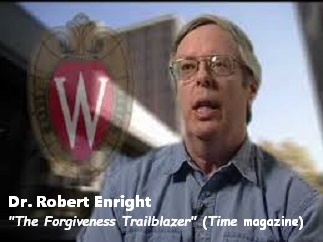A NEW STRATEGY FOR PEACE IN THE WORLD. . . THE ENRIGHT GROUP FORGIVENESS INVENTORY
A team of researchers led by Dr. Robert Enright has taken forgiveness from its traditional focus on individuals to a higher magnitude by concentrating on group forgiveness—an area of intervention that has dramatic implications for its ability to enhance peace efforts in the world.

Dr. Enright’s team, composed of 16 experienced researchers who collected data from 595 study participants in three different geographic and cultural settings of the world, developed and confirmed the veracity of a totally new measure of intergroup forgiveness—The Enright Group Forgiveness Inventory (EGFI). Additionally, the team created and piloted a unique group administration process that operationalized the EGFI in a structured way.
“Our concept of intergroup forgiveness for this study was rooted in what groups, as opposed to the individuals who compose them, have the capacity to do,” says Dr. Enright, a professor of Educational Psychology at the University of Wisconsin-Madison and co-founder of the International Forgiveness Institute. “The study supported the conclusion that this new measure had strong internal consistency, as well as convergent and discriminant validity.”
In other words, to paraphrase Dr. Enright’s synopsis of the EGFI, it works. That is the conclusion reached by Dr. Enright’s 16-member research team in their study report, Measuring Intergroup Forgiveness: The Enright Group Forgiveness Inventory. The study was published earlier this year in Peace and Conflict Studies Journal (Vol. 27, No. 1), as the lead article for that issue of the journal.
To realistically test the measure, the team selected groups of people within countries that have historical conflicts that remain salient today. One group of participants was recruited from Asia with subsamples from Mainland China and from Taiwan. Another group of participants was recruited from Slovenia that contained subsamples from two different political parties with a history of violence toward each other. A third group of participants was recruited from the United States with subsamples that included a group of White Caucasian participants and a group of African American participants.
The new Inventory has 56 items across seven subscales and each subscale has eight items. Those subscales measure a group’s motivation and values regarding forgiveness, peace, and friendliness toward the other group. Similar to the Enright Forgiveness Inventory (EFI)—developed in 1995 and now the worldwide measurement tool of choice for assessing one person’s forgiveness of another—the EGFI has five questions at the end of the scale that are intended to assess pseudo-group-forgiveness or false forgiveness.
For this study, the inventory was translated into Mandarin Chinese and Slovene by native speakers of each language. The Inventory was then administered and assessed with individual participants as well as with the designated groups of participants. That strategy allowed the project team to compare a group-based assessment of forgiveness with traditional self-report assessment of forgiveness.
That assessment was a crucial element of this latest study because the bulk of past research has simply extended measures of forgiveness between individuals to groups. In fact, Dr. Enright et al. produced a study in January 2015 (Journal of Peace Psychology) entitled “Examining Group Forgiveness: Conceptual and Empirical Issues” that was one of the first to propose: 1) a benchmark definition of group forgiveness; and, 2) specific concepts for developing a group forgiveness measuring tool.
Incorporating that earlier work, the newly-developed EGFI scale of intergroup forgiveness is based on a definition of forgiveness between groups and is operationalized using group behaviors rather than individual cognition and emotion.
“Our findings suggest the EGFI is a reliable and valid measure of intergroup forgiveness,” the study group concludes in its final report. “This new measure can facilitate the work of peace advocates and researchers.” The study also indicates the Inventory could be used to:
- Assess where and when to intervene with conflicting groups;
- Evaluate the effectiveness of conflict resolution efforts;
- Assess where groups have been unjust to one another and, therefore, where they could benefit from conflict reduction efforts;
- Assess group forgiveness interventions;
- Evaluate progress when groups go through interventions such as peace and reconciliation commissions;
- Assess change in forgiveness from pre to post intervention; and,
- Advance our understanding of effective interventions.
Meet the Group Forgiveness Study Team:
- Robert D. Enright, University of Wisconsin-Madison and International Forgiveness Institute
- Julie Johnson, University of Wisconsin-Madison
- Matthew Hirshberg, University of Wisconsin-Madison
- John Klatt, University of Wisconsin-Madison
- Benjamin Boateng, University of Wisconsin-Madison
- Preston Boggs, University of Wisconsin-Madison
- Chelsea Olson, University of Wisconsin-Madison
- Peiying Wu, University of Wisconsin-Madison
- Baoyu Zhang, University of Wisconsin-Madison
- Fu Na, Beijing Normal University – Beijing, China
- Mei Ling Shu, Beijing Normal University – Beijing China
- Tomaz Erzar, University of Ljubljana – Ljubljana, Slovenia
- Tina Huang, National Chung-Cheng University – Taiwan (officially the Republic of China)
- Tung-En Hsiao, National Chung-Cheng University – Taiwan
- Chansoon (Danielle) Lee, National Council of State Boards of Nursing – Chicago, IL
- Jacqueline Song, International Forgiveness Institute, Madison, WI (native of the Philippines)




